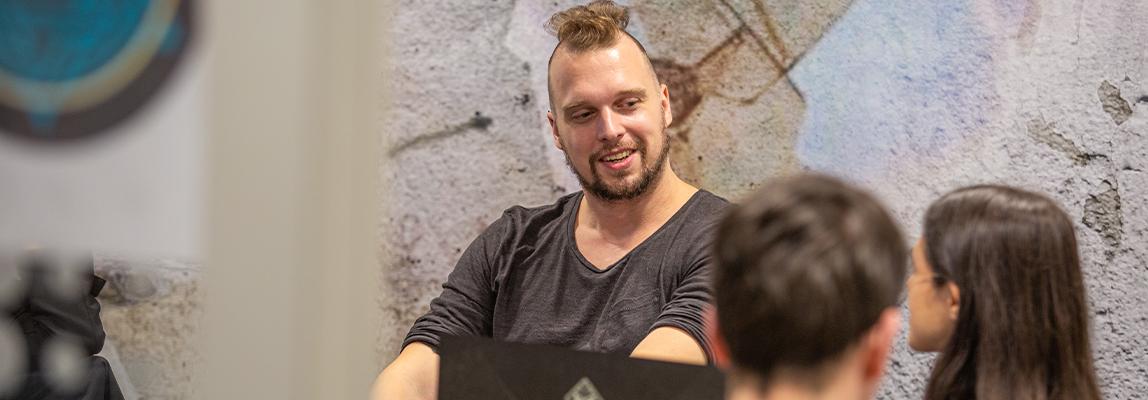
From Best to Tokyo
03/09/2023 - 09:03
- Stories
‘Become a true citizen of the world’ is stated on the website of the secondary school in Best that Perry Leijten used to attend. ‘Oh really?’ he says, surprised, ‘They did not have that slogan at the time, but I guess I have become one.’ Perry had been advised to attend mavo-havo, but he wanted to try vwo. ‘I’ve always said I wanted to go to uni.’ He was successful in that as well. He graduated from BUas (then NHTV) in 2012, which is really considered a university abroad – and certainly in Japan, Perry tells.
How would you typify a true citizen of the world?
‘A character that is curious and open to other cultures. This means to me, without any doubt, that you learn the language of the country where you live. I still have classes twice a week. At work, I manage well with my Japanese because a lot of jargon is used as well. But it’s a bit harder at the hairdresser’s; beards are not very popular here,’ laughs Perry.
It’ll be something like:
ヒゲをもう少し短くしてほしい。
(I’d like my beard a bit shorter please)
Andrew Paquette, lecturer from the very beginning at Games, once said about you that you have everything that’s needed to become good at your field of expertise: curiosity, persistence, modesty, and willingness to work extremely hard. We’ve ticked box No. 1. We can also tick box No. 2: persistence; just look at the beginning of your story.
‘I knew I wanted to go to a university, and I wanted something creative,’ says Perry. ‘That was all I knew. I didn’t have any idea there was a school where you could learn to make games. That’s what I discovered at the Games Expo in Utrecht, which was the trade fair for gamers. And I was one of those. That’s why every year I went through to the next class by the skin of my teeth. I was engaged in gaming rather than in schoolwork. I took a flyer from the Game programme and visited an open day in Breda. If you come and study here, you won’t have any time for gaming anymore, they said. That was clear from day 1: this was going to be hard work. We had to submit assignments every week. I had to wait for a placement position at Guerilla Games in Amsterdam for six months, and so I did because I wanted to do my placement there per se. I learned Python (a programming language, ed.). They all said I would get on well with it.’
And now you’re a specialist in Rigging & Scripting. When I think of rigging, I think of sails and ropes, everything needed to propel a ship.
‘I tie things together and make sure it works,’ responds Perry. ‘I actually create the skeleton of a character. Think of a marionette that is set in motion with strings. It is quite mathematical; you need to make many calculations to create a sort of true-to-life rendering.’
You’ve just said you went through to the next class every year by the skin of your teeth. Were you good at maths?
‘Maths was really not my thing,’ admits Perry, ‘nor was rigging. I was always struggling with it in class. Then I threw myself into scripting throughout my summer holidays, and as a result I finally got the hang of rigging. Scripting has everything to do with codes, with programming. Rigging is more about how things look, the visual aspect. As a Technical Artist you work exactly at that interface.’
Throughout the summer holidays? Your lecturer said it already, Perry is willing to work hard.
‘I work very hard, so I can be lazy as much as possible,’ jokes Perry. ‘I work on options to be able to do things in a simple way. And you know, I’m having more and more fun at it. Hardly anybody likes to do what I do. Programmers think in terms of mathematics, Visual Artists are mainly engaged in the picture. I’m in between, and I’m one of the mere handful of people specialising in Technical Art.’
No time to be lazy then?
‘That’s right, but it’s great fun when you’ve discovered or created something. I love to share that with others, so I’m not that modest. Make sure to show off what you’ve done, I always say, what could be done faster and better? That’ll cause the whole industry to move forward. If there’s still an NDA (Non-Disclosure Agreement, ed.) in place, it won’t be possible. So no, I can’t tell you what I’m working on right now.’ That’s a pity… ‘You usually work on a game for five years, so you must be patient!’
Being patient, that’s what you surely learn in Japan?
‘Surely, when I can’t make myself understood in Japanese, they’re very patient with me indeed. They themselves hardly speak English although they’re taught the language. They have too little self-confidence to speak it, so it seems. Dutch people will switch to English rather easily if somebody who doesn’t speak the language joins them. That’s what I noticed at Guerilla Games, too. The Japanese won’t do that, but when you give them a few beers, they get fluent in it straightaway!’
A good idea for the curriculum perhaps? A BUas Club? Japanese classes?
‘Who knows, it would have been useful for me. Fortunately, there are some more former fellow students here. I always enjoy speaking Dutch again for a while. A tip for graduates: stay in touch with other alumni. I used to live in an anti-squat building in Breda with Jan Pijpers. Jan was in the first cohort and he eventually persuaded me to move to Japan. I come to the Netherlands once a year, and sometimes for a guest lecture. And if things become too technical for lecturers, they ask me whether I have time!’ Big grin.